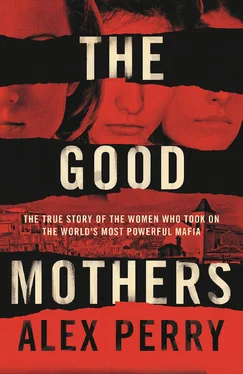Unpicking the paradox of how this desperate place could be home to such a rich criminal empire was key to the story of the ’Ndrangheta’s modern rise. It began at 3 a.m. on 10 July 1973, when a small gang of ’Ndrangheta toughs from the villages around Gioia Tauro kidnapped John Paul Getty III, the sixteen-year-old grandson of the billionaire John Paul Getty, from outside his home in Piazza Farnese in central Rome. The gang held the boy in the Calabrian mountains for five months. His father, who had been in a heroin-induced haze at the time his son was taken, initially thought the kidnapping was a hoax staged by his son to obtain money. The kidnappers called the family patriarch, John Paul Getty Snr, and threatened to cut off his grandson’s fingers unless they received a ransom of $17 million. The elder Getty refused, arguing: ‘If I pay one penny now, I’ll have fourteen kidnapped grandchildren.’ To press their case, the gang cut off John Paul III’s left ear and sent it to a newspaper in Rome. It was accompanied by a note threatening that the second ear would be arriving in ten days unless the ransom was paid. Getty Snr relented and paid $2.2 million, the maximum his accountants advised him was tax-efficient. He loaned the final ransom balance of $700,000 to his son, the boy’s father, at 4 per cent interest.
John Paul Getty III never recovered from his abduction or his grandfather’s indifference. He died at fifty-four, an alcoholic and drug addict in a wheelchair, having been crippled at the age of twenty-five by a near-lethal combination of Valium, methadone and cocktails. But for the west coast ’Ndrangheta, these grubby beginnings were the seeds of an empire. They went on to stage 150 more kidnappings. In Gioia Tauro, they used the ransom money to buy construction trucks. ’Ndrangheta men inside local government ensured these trucks were contracted for the building of a steel plant near Gioia Tauro port. When the government abandoned that project as uneconomic, the trucks went to work on a bigger site: the expansion of the port itself.
State construction contracts – building motorways, high-speed rail links, and even wind and solar farms, while loan-sharking at extortionate rates to force rivals out of business – went on to become a giant, profitable ’Ndrangheta business in its own right. By the time Alessandra was posted to the west coast, a project to widen and repair the arterial highway running from western Calabria up Italy’s coast to Salerno had somehow ended up costing the state $10 billion in three decades for what was still little more than a succession of roadworks. 2The biggest earner, however, was Gioia Tauro port itself. Once its expansion was finished, the port was the largest container facility in Italy and the sixth largest on the Mediterranean, with a capacity to load and unload millions of containers a year on a quay that ran for three and a half kilometres and was backed by an avenue of towering cranes. The ’Ndrangheta, as the only power in the area, had total control. The group ‘taxed’ every container passing through the port at $1.50 a time. It charged the port operators fees amounting to half their profits, an annual income that ran into several billion dollars. It used the port to send weapons around the world. And in the 1980s and 1990s, during la mattanza , it was through Gioia Tauro that the ’Ndrangheta built its cocaine empire.
But aside from a single street of new houses in San Luca nicknamed Via John Paul Getty in a small town to the south, there was no sign of the ’Ndrangheta’s wealth. To the ’Ndrangheta, a façade of poverty was crucial to the lie. It helped it escape the attention of the state and added credibility to its claim to be championing a deprived south against an oppressive north. The ’Ndrangheta went to mulish lengths to service its pretence. When Alessandra first visited Rosarno, Domenico Oppedisano, a seventy-eight-year-old ’Ndrangheta big shot, could still be seen in his battered trilby and dusty suit, driving around in a three-wheeled van and delivering his oranges and lemons to market.
For the 97 per cent of Gioia Tauro’s population who were not ’Ndrangheta, however, the deprivation was real. Calabria was the poorest province in Italy. Incomes were around half those in the north, unemployment ran at 28 per cent and even in 2009 roasted dormice were considered a delicacy. The provincial government, meanwhile, was so dysfunctional that in 2008 a US embassy fact-finding mission concluded that, were it an independent state, Calabria would be a failed one.
As she was driven around the estuary delta between Rosarno and the port, Alessandra found it easy to guess who had ruined it. The area was latticed by a series of two-lane highways connected by a spaghetti of looping off-ramps and roundabouts, a modern industrial grid built with tens of millions of euros donated by the European Union and the Italian government. Economists and bureaucrats in Brussels, it seemed, had imagined a new warehousing zone to support the port that would single-handedly reverse the economic fortunes of one of Europe’s poorest areas. Initially, ’Ndrangheta construction companies had been happy to take what public money was on offer. Then the ’Ndrangheta squashed the project. Threats, violence and demands for crippling protection payments had ensured all but one of the international transport and logistics businesses proposed for the site had either closed or never opened. Weeds and thickets of bamboo edged far out into the road. Tarmac roads and concrete bays cracked and splintered in the sun. Giant bougainvilleas surfed out over the walls of empty business parks. Once-luxuriant palms were grotesquely overgrown, their green starbursts turned sickly yellow by a layer of sticky dust. Street lights were ubiquitous but lifeless, connected to a field of large black solar panels fast disappearing under long grass. Rusted signs, some peppered with shotgun blasts, pointed the way to now-defunct enterprises whose gates were decorated with sun-bleached strings of international flags. In front of one grand entrance, a giant brass globe on a spike stood at a crazy angle, a dream of world domination turning, continent by continent, into a small pile of rusted metal on the ground. The only sign of life was a herd of goats grazing in drainage ditches choked with poppies, buttercups and pink and purple flowers and, to one side, a tented camp of several thousand African migrants, whom the authorities, or possibly the ’Ndrangheta, had peevishly kept off site.
The place felt like a war zone. And in a way it was. Covering the entire summit of a hill high above the port was a complex of sprawling villas and gardens once owned by the Piromalli clan, in whose territory the port lay. From here, the Piromallis had surveyed their empire like generals. The state had eventually confiscated the property but, since no one was willing to buy it, the houses and gardens were empty, an obstinate and unmissable reminder of where real power lay. Below the villa walls was a chapel and graveyard filled with baroque ’Ndranghetisti graves. Since it had been built without permits, the local authority had ordered the chapel demolished, only to discover that no local contractor was available to do the work.
In all of Gioia Tauro, a few lone entrepreneurs had taken a stand. One was Antonino de Masi, who in the 1990s decided to diversify the family agricultural machinery conglomerate into transport logistics. The business had foundered under ’Ndrangheta pressure and de Masi now pursued other ventures, such as marketing earthquake shelters and smokeless pizza ovens, both of which he had invented himself. But he refused to leave his offices. That simple act of defiance had cost him dearly. After receiving numerous death threats, de Masi had sent his family to live in northern Italy. De Masi himself was obliged to move around in an armoured car, flanked by two bodyguards. Two uniformed Italian army soldiers with automatic rifles and a camouflage jeep stood guard in his office car park. De Masi described himself as ‘living in enemy territory’. 3
Читать дальше












